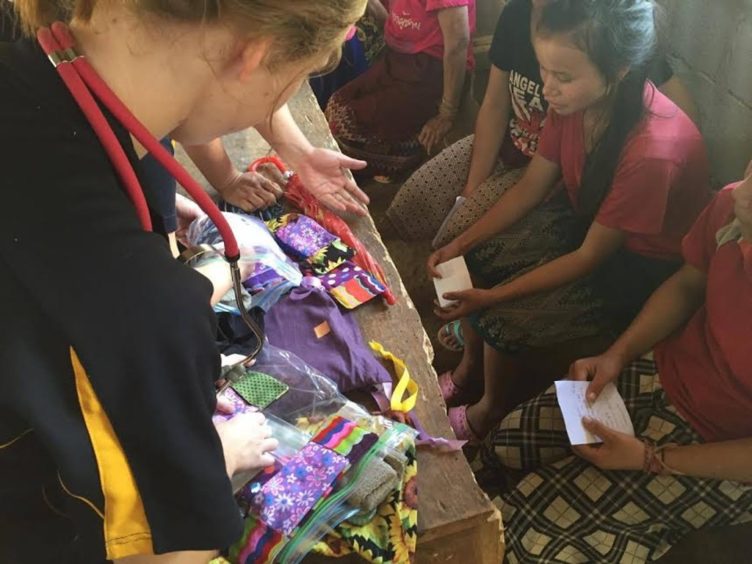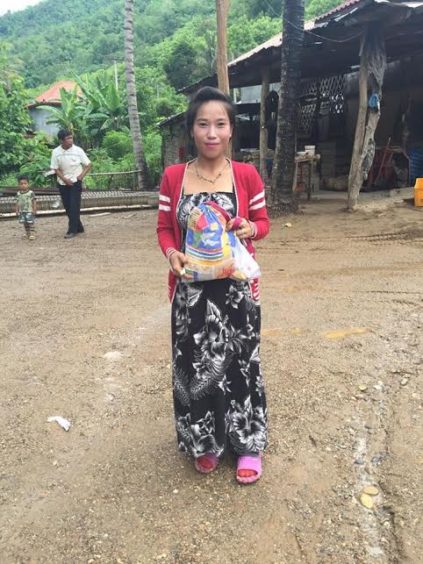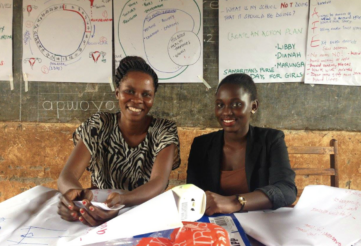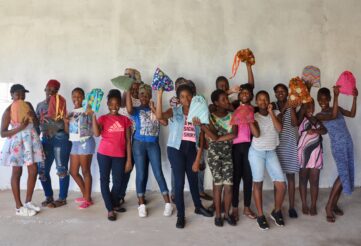Days for Girls Goes to Laos

25th July 2016
In June this year, myself and a team of 9 other nursing students, as well as two registered nurses traveled to Laos to set up health clinics in local communities of the Seung Valley as a part of our studies at university. At these clinics we provided health education and promotion, conducted health assessments and distributed medications. We assessed, diagnosed and treated approximately 100 patients each day and as a part of our work we were able to hand out Days for Girls kits to girls and young women. This was a fantastic addition to our trip and made a real impact in terms of the healthcare we were able to offer.
As we were packing our bags of supplies to take with us to each clinic, I was amazed at the response my team members had to the kits. I think I had become used to being around them after sew days and meetings with my local chapter but to see how excited my team was at the vibrant and beautiful packs, so clearly created with love and purpose made me very humbled.
Where previous trips from our University visited schools to hand out these packs, we were not able to do so because schools were not in session during the time we spent in the villages. At first we began handing out packs to each individual young woman while they had their health assessment. This method worked well but we had difficulty in that that many young women were with fathers or brothers and it was inappropriate, not to mention embarrassing for the girls to bring about discussions around them.
We then adapted a system at our next clinic where after we had gone through our health promotion and begun seeing patients at the clinic we would separate a group of young women while they waited to be seen. Wherever we could find space away from the business of the clinic, usually in the shade somewhere under a tree or shelter we would gather the girls around. As the Lao women speak very little English, we relied on a translator to make the most of our distribution. One of our fellow nursing students, Phim, was a huge help for us in this way, speaking near fluent Laotion. The Laotian girls are beautiful but extremely timid. Luckily for us Phim has a fantastic sense of humor so she dismissed the shy nature of the girls and had them smiling and giggling to put them at ease.
We found that two of us working with a group of around 10 girls in a semi-private area made sure we were able to get the full attention of the girls, but make them feel comfortable with the security of their friends around them. Often some girls were too shy to join the initial group we gathered but as other young women carried their packs around and showed their friends what was inside, news spread quickly. As we walked around the clinic the whole day young women (and sometimes very old too, we had to do some explaining there!) tugged on our shirts, pointed to their friends pack and pointed to themselves as if to say “One for me too!”
In distributing the kits we were able to use the pack as a resource to undertake a brief discussion of menstruation. As said above the young women are very shy so their level of understanding was at times hard to gauge but kits provided us with an opportunity to bring up these topics which we would not have otherwise been able to; and, for that they are invaluable. We would then open a pack as a demonstration and show the girls how to use the liners, wash them and care for their pack. The girls were rapt with quiet attention as we explained this and obviously excited to receive their pack at the end of the discussion.
It was a very rewarding experience handing out these packs to the girls. Around ages 12-16, girls already struggle with barriers between themselves and their education. The villages we visited included many families from the highlands, beautiful country in the mountains that is unfortunately usually of great distance from schools. As the predominant occupation in the highlands is farming, many of the girls must stay and work for their family rather than continue with their schooling as they get older. We can’t help remote location or their need to work to help their family, but by giving these girls packs we are reducing one barrier between them and their education. Not to mention- each kit gives them control over their body and dignity and that is incredibly powerful! To have something just of their own is precious to the girls, and it was beautiful to see the kits which have been crafted with love by women in my home city received with admiration and gratitude by the girls in Laos.
In addition to the standard packs we were able to take over a small number of postpartum packs for pregnant women, (or women who had just given birth). We quickly discovered through discussion with local healthcare workers we partnered with that most women do not go to hospital or clinics to give birth nor do they have midwives to assist with the birthing or postpartum care. Therefore their health knowledge in regards to postpartum bleeding is virtually non-existent. We saw this first hand when two gorgeous new parents came to our clinic from their home in the highlands. She told us she was concerned because she was bleeding for days after the birth. Our first response was “Of course, you just had a baby!” but where you have no access to health care postpartum bleeding is not discussed and the mother suffers anxiety and shame. From there we realized the importance of education for the pregnant women we saw by discussing bleeding to be expected after the birth and how to manage the bleeding with the postpartum pack. It was rewarding to know these packs were reaching young women with no access to post-natal care and that they would keep them healthy and thus able to care for their baby after the birth.
We had only a few issues with our distribution. In one village we had the issue where girls were trying to claim more than one pack each, either by telling us they didn’t already have one, or that they needed one for a friend. We were unprepared for this, but it being only a few girls asking where we could we gave them a second pack for their friend. Whether it actually reached the friend or not we were uncertain but we decided we would rather trust their honesty then have them go without. I am sure the few extra packs we distributed that day would not be wasted in any case. From then on at our clinics we kept a record of girls who has received packs by marking their health assessment forms (given to every patient at the clinic) or hands with a star to indicate they had been given a pack. When they asked for packs for friends we kindly let them know their friends could get one at any time during the clinic by coming and letting one of us know personally. Secondly we had an issue where older women or even elderly women would ask us for packs. We learned from explanation from a translator that we were able to get across the packs and they had to be distributed to young women only as we had limited numbers, and often we were able to offer the older women other donations we had with us instead such as soap or toothpaste. Our only other issue, as I’m sure is true for all distributions worldwide, were the trouble making boys that we had to repeatedly shoo away from our discussions!
Overall Days for Girls was a fantastic success in Laos. I think for my team the main theme that resonated with us was the sustainability of the pack. Where in other instances, for example medications we were only able to distribute a small bottle of children’s paracetamol for a large family knowing it would only last up to a month. However with Days for Girls we could give a young woman this kit and it would serve her for years. It would give her the freedom to stay in school, be social and take care of her hygiene and health for years to come. As nurses and nursing students we’re passionate about primary health care and maximizing health literacy and health outcomes. As young women ourselves we’re so grateful to be able to share the simple dignity of hygiene products. The packs encompass health promotion, self-care and hygiene as well as promoting dignity and comfort and we are very grateful to have been a part of that.

Lauren Hickford









